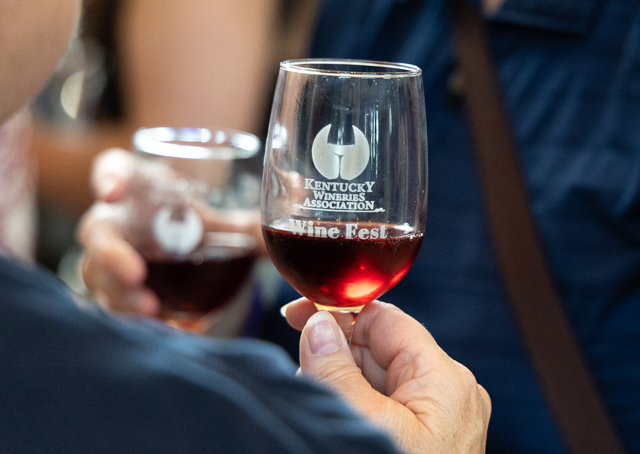‘Wet’ advocates make final push to put question on ballot
Published 9:00 am Thursday, August 23, 2018

- Elizabeth Dillard (from left) signs a petition Wednesday, August 22, 2018, in front of volunteers Kim Wilkinson and Heather Skaggs at Griffs Deli. Warren Countians for Economic Growth, a group formed to promote the drive, hopes to get a local option wet-dry vote on the Nov. 6 ballot.
With time running out, proponents of countywide alcohol sales in Warren County have gone electronic in hopes of reaching their goal of getting a local option wet-dry vote on the Nov. 6 ballot.
Warren Countians for Economic Growth, a group formed to promote the drive to get the 12,300 signatures – 25 percent of the number of votes cast in the last general election – needed by noon Friday, created a website (makewarrencountywet.com) that allows county residents to sign the petition electronically.
Trending
The group also has a Facebook page and a Twitter account dedicated to getting the word out about the e-signatures and the growing number of locations where paper petitions can be signed.
Posts on the group’s Twitter account indicate that the petition drive, after coming up with less than half the needed signatures by the original deadline of Aug. 14, is going well.
“The ability to sign the petition online has been great,” Angie Mosley of Bowling Green’s Highland Stables event venue said in a text message. “It’s going really well. We see the end in sight finally. We just need a final push in the next couple days to get across the finish line.”
Mosley is one of many representatives of wedding and event venues who have been pushing the petition, which she believes is important because it “will give the citizens of Warren County a voice in November.”
Warren County First District Magistrate Doug Gorman, who has expressed support for the petition drive on social media, said it’s important that county residents have a chance to vote on the issue.
“It’s an important enough topic from an economic development standpoint that the citizens need to be heard,” he said. “There’s no guarantee it will pass, but anything you can do so that people can vote up or down is good. I’m interested in seeing what the community says on the issue. I think the group that’s driving it has worked really hard in a very short window.”
Trending
Not as short as it could have been. The original petition to get the question on the general election ballot was filed Aug. 1 by Bobby Massey of Smiths Grove, who is associated with the Elkins Grove event venue. That petition’s deadline to collect the 12,300 signatures was Aug. 14, but the effort netted only 5,858 verified signatures.
The petition’s supporters then requested a special election on the wet-dry issue to be held on the same day as the general election, thus buying 10 more days to add to the number of signatures.
“They have the ability to do that because they fall under the local option election statute,” Warren County Attorney Amy Milliken explained.
Gorman said the effort to transform Warren County from a “moist” county that contains the wet city of Bowling Green is important if the county is to keep pace with many neighboring counties that have gone wet in recent years.
Adair, Barren, Cumberland and Metcalfe counties all voted to go wet in 2016, making it harder for rural Warren County businesses to compete.
“This (local option election) can give an opportunity for certain businesses in the county to have events where they can serve wine or other alcohol,” Gorman said. “The whole thing driving this from the start was venues wanting to have fundraising events where they’re able to serve alcohol.”
After getting the extension because of the special election request, the petition’s proponents got another break because of a 2016 ruling from the Kentucky Attorney General’s office. That decision in an Ohio County local option election petition drive allowed electronic signatures, and the measure did get on the ballot only to be defeated in a close vote.
Both Milliken and Warren County Clerk Lynette Yates said support for going wet appears to be strong, but some resistance is already evident.
Tommy Davis, who lives in Bowling Green’s Sugar Mill subdivision, isn’t hopeful about the ultimate outcome but still opposes expanding alcohol sales.
“I don’t think they should’ve extended the deadline (for signatures),” Davis said. “A deadline is a deadline. But I’m pretty sure it’s almost a given.”
Davis doesn’t like the idea of serving alcohol at rural event venues, saying: “Those people didn’t get there by bicycle, so they’ll be drinking and driving. I don’t really think we need more outlets for selling alcohol in Bowling Green.”
Scott Bee, pastor of Bowling Green’s Lakeview Fellowship Church, agrees.
“We need to keep it (alcohol) out of the county,” Bee said. “Why do you have to serve alcohol to have a good time? A lot of the people going to those events in the county are going to leave intoxicated.
“It (alcohol) has ruined many people’s lives. I think those people who want the county to remain dry should speak up.”
Opponents did express similar concerns in some of the local option elections held in neighboring counties, and nearly all of those votes were close; but Metcalfe County Judge-Executive Greg Wilson said going wet has been largely positive for his county.
“We’ve had three liquor stores open, and several other places in the county are now selling beer,” he said. “It has helped create some jobs.”
In Barren County, Judge-Executive Micheal Hale said the county treasurer’s office has issued 10 new licenses for alcohol sales since passage of the wet-dry vote in 2016. In addition to creating some jobs, the alcohol sales have resulted in a new revenue stream for the county.
Barren County collects quarterly a regulatory fee from alcohol retailers amounting to 5 percent of their gross sales. But that money is restricted to use for law enforcement purposes related to the alcohol sales.
“There has been an increase in revenue for the county,” Hale said, “and it has allowed us to have some extra money for law enforcement.”
Warren County Judge-Executive Mike Buchanon isn’t sure what the impact of going wet will be for the county coffers, but he supports giving residents a chance to vote on the issue.
“We have not investigated the potential for revenue or the statutory requirements for putting those potential revenues to work for county government,” Buchanon said. “Our discussions have been focused on economic development and addressing the competitive disadvantage that our rural Warren County businesses and event venues are experiencing since the people in surrounding counties and so many other Kentucky counties have voted their counties wet in recent years.
“We believe that the people of Warren County have a fundamental right to decide and deserve to vote our county wet if they wish, to level the playing field to strengthen Warren County venues and help to bring more business to our county.”






